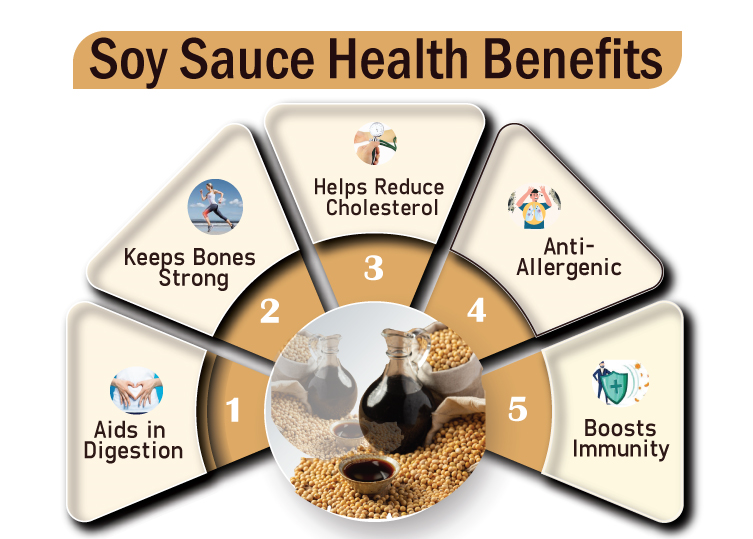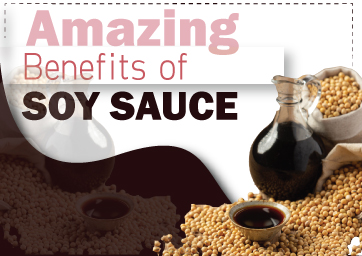What is Soy Sauce?
Soy sauce is a popular fermented food product that comes from soybeans. It is commonly used in Asian cooking. Its rich flavor comes from the fermentation process.
It provides a salty and savory flavor to various dishes and is also high in sodium. It has been part of Chinese and Japanese cuisine for centuries.
Although most people can safely consume soy sauce, some may exhibit allergic reactions. If you have a soybean or wheat allergy, you should stay away from soy sauce. Otherwise, enjoy it as an irresistible sauce with your favorite recipes!
What is Soy Sauce Made Of?
The four essential soy sauce ingredients are soybeans, wheat, salt, and fermenting agents.
Regional soy sauce variations may have varied proportions of these components and other ingredients for color and flavor. So it is always wise to read soy sauce nutrition labels.

How is Soy Sauce Made?
Here's a small overview of all the steps involved in the making of Soy Sauce:
1. Fermentation
First, Soybeans are soaked in water at room temperature until they swell. Then they are ground into small pieces and mixed with salt, rice wine, and wheat flour.
The mixture will be cooked and cooled down at different times before being transferred back to the fermenting vessel. It is stirred regularly throughout the entire process.
This fermentation process is the reason for the many health benefits of soy sauce.
2. Salt
After the soybeans are fermented, they are boiled in salty water. Next, they are drained and dried to remove excess moisture. They are then roasted over a fire to increase their flavor. Finally, they are crushed and kneaded to create a paste-like consistency. This is called tamari.
3. Sugar
Sugar is added to soy sauce after the roasting stage. It is used to balance the flavors of soy sauce.
4. Alcohol and Stabilizers
Alcohol is added to soy sauce to preserve its freshness. Stabilizers are added to soy sauce to prevent the formation of lumps.
5. Color, Flavoring, and Preservatives
Colors are added to soy sauce in various forms to enhance its appearance. Flavorings are added to soy sauce for extra aroma and taste. Preservatives are added to soy sauce so that it does not spoil.
6. Aging
Once the soy sauce is ready, it is aged for a considerable period. During this time, the soy sauce undergoes natural changes. As the soy sauce ages, it becomes darker and richer in flavor.
Nutritional Value of Soy Sauce
Soy sauce is a good source of protein and contains many vitamins and minerals such as B vitamins, iron, and zinc.
Types and Varieties of Soy Sauce
Soy sauces vary significantly in color, flavor, consistency, and salt content.
You will find two basic types of soy sauce: dark and light. Dark soy sauces have a richer taste and darker color than light soy sauces. Dark soy sauce is produced using roasted soybeans, while light soy sauce uses unroasted soybeans.
There are wide soy sauce varieties, including Chinese black bean sauce, oyster sauce, rice wine soy sauce, and Japanese shoyu. Each type of soy sauce has its unique flavor and uses.
● Dark Soy Sauce
It's frequently referred to as Chinese cooking oil. Due to the addition of caramel color, it is darker than regular soy sauce. It is occasionally used as a dipping sauce or marinade.
● Light Soy Sauce
As the name suggests, it is strikingly darker than light soy sauce in color. It has less sodium and less salt in it. Typically, it is used as a dipping sauce.
● Chinese Black Bean Sauce
Chinese black bean sauce is similar to light soy sauce in appearance and taste. However, it is thicker, sweeter, and used primarily as a dipping or basting sauce.
● Oyster Sauce
Oyster sauce is a thick brownish liquid that comes from oysters. While used primarily as a dipping sauce, in some cases, it is added to soups or stir-fried dishes.
● Rice Wine Soy Sauce
Rice wine soy sauce is a sweetened version of regular soy sauce. Because of its sweetness, it makes a perfect dipping sauce, especially for sushi.
● Shoyu
The Japanese word for salt is shoyu. It serves as a catch-all word for all soy sauce. More often than not, it is thinner than conventional soy sauce. Its color might range from soft yellow to dark red.
Soy Sauce Health Benefits
Here are five excellent health benefits of Soy Sauce.

1. Boosts Immunity
Soy sauce contains isoflavones, which have been shown to reduce inflammation and boost immunity. Soy sauce also contains antioxidants called polyphenols, which help reduce fatigue and improve mental performance.
2. Keeps Bones Strong
Soy sauce maintains bone density and decreases osteoporosis risk. In Japan, where soy sauce is traditionally consumed, older women have relatively low bone loss compared to their Western counterparts.
3. Helps Reduce Cholesterol
Soy sauce contains protein, fiber, and B vitamins. All these components work together to reduce Cholesterol. The probiotic bacteria in soy sauce help digest fats and keep the Liver healthy. It also aids in bile production, lowering Cholesterol.
4. Aids in Digestion
Soy sauce stimulates digestion. It contains high levels of glutamic acid, which triggers the release of hydrochloric acid from the stomach. Hydrochloric acid breaks down proteins and starches in our diet, making them easier to digest. Glutamic acid also increases saliva production, helping us to chew foods properly.
5. Anti-Allergenic
Soy sauce contains soy protein, salt, and sugar. These three ingredients work together to make soy sauce anti-allergenic. Many people have reported that they reduced their symptoms after eating foods containing soy sauce.
Soy Sauce Risk and Side Effects
Soy sauce has risks and adverse effects just like any other condiment. The most notable is its high salt level, which can harm some people. If you already have hypertension, sodium might make you retain fluid and raise your blood pressure.
Soy sauce also includes sugar, which, when consumed, turns into fat. While fat contributes to obesity, sugar can cause weight gain.
How Much Should Soy Sauce be Used?
Many people use soy sauce as a seasoning in their food, while others use it strictly for cooking. But how much is too much?
How much soy sauce to use in your recipe is not subject to strict guidelines. However, just a small quantity will do. Use a bit to flavor other foods like fish, vegetables, and sushi.
If you're not sure how much soy sauce to add, here's what you need to know:
• Too little soy sauce can make your dish bland and tasteless.
• Too much soy sauce can cause your dish to become salty.
• If you want to avoid adding salt, try using low-sodium soy sauces.
Conclusion
We believe we have more or less answered the question that most people ask these days- "Is Soya Sauce Healthy?" Of course, it is. Japanese people have the longest life span and use soy sauce more frequently in their diet than other people on earth.
While we don't mean to say that Soy Sauce is the secret behind it, we do mean that Soy Sauce is generally safe and risk-free. Keep in mind that soy sauce is great in moderation. Here are some valuable tips so that you can get all the health benefits of Soy Sauce.
● Use soy sauce sparingly. A tablespoon of soy sauce is equivalent to about 1 teaspoon of salt.
● To use soy sauce as a marinade or dipping sauce, dilute it with water before adding it to meat, fish, vegetables, or tofu.
● Add soy sauce to dishes at the end of cooking rather than adding it at the beginning.
● Check the soy sauce nutrition label for added salt or sugar.
● Try using different brands of soy sauce to find the one you prefer.
That'sThat's all for now about your favorite dipping sauce. Hope you learned all about soy sauce and will share these great benefits of soy sauce with those around you.



 Contact Us
Contact Us






 Hospitals
Hospitals
 Doctors
Doctors
 Diagnostic
Diagnostic
 Pharmacy
Pharmacy
 Health Tips
Health Tips
 Blog
Blog



















Comments